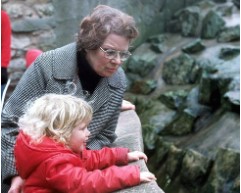Extraverts in Retirement
- Aria Fox
- April 8, 2023
With advancing age, their Myers-Briggs personality scores of people can change, but not by much. Extreme scores on one or more traits tend to soften and move toward the middle. The ESTJ who had a strong thinking (T) score is likely to move a little toward Feeling, with stronger emotional elements in their personality than previously. This blog describes the eight Extraverted (E) types in their retirement years. Every combination of traits is represented, making eight in all—Extraverted plus Sensing (S) or Intuition (N), Thinking (T) or Feeling (F), and Perceiving (P) or. Judging (J).
ESTPs in Retirement

ESTP elders continue to have the same characteristics they did when younger. Many of them choose to retire early so they’ll have more time to do the things that are fun. They like activities which require solving problems that are often difficult and tense.
While they may take part in various organizations, they avoid leadership positions. Taking charge is not in their repertoire. They become involved mainly for the activities.
When grandchildren arrive, the elders take pleasure in outings to the zoo, sports events, and so on. Children love their spontaneity and ability to improvise games on the spot.
ESTJs in retirement
Because ESTJs often have a long history in of employment, their financial needs may be taken care of. However, they’ve become so accustomed to work that the idea of full-time leisure may intimidate them. Unless they’ve developed personally during their younger years to include activities that are flexible and rewarding, they may find retirement difficult. Many compensate by learning to think in terms of priorities and start making lists. Removing the spontaneity factor and therefore absolved from dealing with the emotional content of activities is more comfortable. ESTJs are efficiency devotees. It something is not on their list, they forget about it even though it may be of immediate importance and others may try to sidetrack them.
ESFPs in retirement

In retirement, ESFPs continue their people-oriented life, keeping old friends and continuing to provide the amusement and comradeship of years past. They have an optimism that is contagious and draws others to them. When ESFPs have unfortunate experiences, they’re often able to look at the sunny side. While some nursing home residents despair about their futures, ESFPs are likely to enjoy new friends, freedom from responsibilities, and new activities to participate in.
Because their friends of the past have enjoyed them so much over the years, they’re unlikely to abandon the friendship.
The want to help out where they can.
ESFJs in retirement
ESFJ elders don’t change much in their relationships after retirement. They keep doing nice, thoughtful things for others, and their company is a pleasure. They continuing scheduling lunches and other outside activities with former colleagues. They make follow-up calls and send notes. If they have grandchildren, they’ll help the parents in any way they can—baby-sitting, picking up the children at school, taking them on outings, and so on. Whatever they can do for others around them to make experiences more enjoyable, they do. It makes them feel good that others appreciate their efforts.
ENFPs in retirement
ENFPs remain young in spirit as they age, maintaining characteristics from their youth such as a zestful enjoyment of life, curiosity, and enthusiasm. As a result, people of all ages, including children, enjoy their company. They look forward to retirement as a time when they’ll be free of the restrictions and boundaries of the work world and can take pleasure in activities for which they’ve never had enough time when employed. Because they look for possibilities before realities, some of their activities may not be considered age-appropriate, such as joining the Peace Corps. However, if they become disabled or suffer from lack of money, they may get depressed because of all the opportunities missed.
ENFJs in retirement

ENFJs leaving full-time employment often look for places to live where they have family and friends or other close personal ties. Relationships and values were always important to this type, but they become even more so in retirement. Many ENFJs who previously did service work on the job, look for similar opportunities on a volunteer basis. They do this gladly, believing that an important goal in life is to help others. One of the lessons many need to learn is to let others help them some of the time. They are so used to giving help that it’s hard for them to imagine accepting it. ENFJs go out of their way to encouraging their grandchildren, reading to them, helping them with homework, etc.
ENTPs in retirement
ENTP have many inspiring ideas and projects during their working years, and these continue into retirement. While they may not have planned financially for these years, they have certainly given a lot of thought to the types of things they dream of doing. However, money may be a problem. Since it’s likely that they’ve changed jobs a number of times, they may have no stable retirement income to depend upon. However, they remain enthusiastic about their ideas and may find other lucrative means of earning a living that use their ingenuity. Some start new businesses that generate enough income to support their interests in old age. The desire for challenge, newness, variety and change don’t disappear as the years pass.
ENTJs in retirement

All their lives, ENTJs have been rewarded with leadership positions at work and in community organizations. They have always had a strategy in which potential for future gain outweighs risks. Because they are hard drivers with strong goal orientation, the prospect of retirement and long lazy days may be daunting to them. Inactivity makes them restless and the thought of filling their time with nothing of consequence dismays them. The chances are that finances are no problem because their careers have been so successful. Many continue to work as consultants to the same firms where they were previously employed.
Maintaining autonomy is one of their major retirement goals.
They need to learn to rely on others some of the time even though it’s difficult for them.
